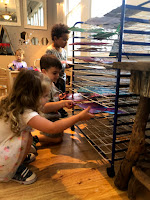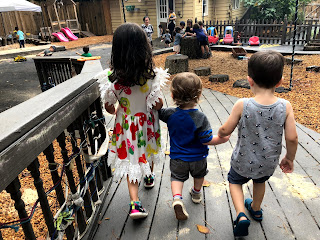During our meet the teacher sessions we had parents trace their child's hands, this was our segue into talking about what our hands can do to be helpful. Here, parents have a hand in our project, strengthening our school family as a whole.
We cut the hands out and allowed the children to paste and paint at free will. Once we were finished and the artwork was dry, we invited the children to help us hang them up. Exercising free will, some chose to help while others allowed their friends to hang theirs because they were buys on another activity. Choices are always good to offer when appropriate.
We've got our classroom routines down pretty well by now! Upon entering the building back packs get hung, lunch boxes and water bottles removed then placed into individual cubbies, then the children follow visual prompts to see what room they start in and what is open vs. what is closed.
Circle time is the optimum time to introduce classroom routines and rituals, along with any rules/agreements. We demonstrated how to carefully put our things away because we noticed clean up time became more of a demolition frenzy rather than mindful cleaning to be helpful. We also made a mini classroom on a tray so children could reinforce what they are learning to do themselves.
See how helpful our friends are becoming? Holding doors, sweeping up messes so friends to slip, carrying something for another, working together, teaching each other new skills, and the list goes on. By displaying our mitzvot (good deeds) in class through panels of documentation, books, and social games, we reinforce good behavior and provide references to refer back to from time to time.
How fortunate we are to have multiple sets of siblings attending our school. We see each other in the yard, celebrate reunions daily, and foster support through connection and role modeling.
By now we all have a good idea of how we best respect our friends and space. With a lot of patience, forgiveness and the assumption of positive intent, we are learning and growing together. According to conscious discipline, the creation of healthy connections with other people wires the brain for improved impulse control and a willingness to cooperate. We hope you enjoy our journey and can carry out these same methods at home or in your classroom.
See how helpful our friends are becoming? Holding doors, sweeping up messes so friends to slip, carrying something for another, working together, teaching each other new skills, and the list goes on. By displaying our mitzvot (good deeds) in class through panels of documentation, books, and social games, we reinforce good behavior and provide references to refer back to from time to time.
By now we all have a good idea of how we best respect our friends and space. With a lot of patience, forgiveness and the assumption of positive intent, we are learning and growing together. According to conscious discipline, the creation of healthy connections with other people wires the brain for improved impulse control and a willingness to cooperate. We hope you enjoy our journey and can carry out these same methods at home or in your classroom.






















No comments:
Post a Comment